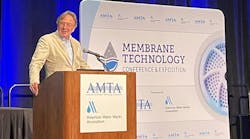By Patrick Crow
The Obama Administration has created a finance center within the Environmental Protection Agency (EPA) to leverage private sector capital and expertise to improve the nation's water infrastructure.
It also proposed that Congress pass legislation to establish a new style of municipal bond to facilitate projects that combine public and private investments. EPA has noted that the nation needs to spend more than $600 billion during the next 20 years to maintain and improve its water infrastructure.
The actions were part of President Obama's Build America Investment Initiative, launched last July, to create opportunities for state and local governments to collaborate with the private sector to expand public-private partnerships (PPPs) and increase the use of federal credit programs.
The Agency explained that the new Water Infrastructure and Resiliency Finance Center will serve as a resource for communities, municipal utilities and private entities as they tackle water infrastructure needs with limited budgets.
Further, it noted that not only is water infrastructure aging but the impacts of climate change -- including intense and frequent storms, drought, floods, sea-level rise, and water quality changes -- are also creating challenges for communities.
EPA said the center would build on the success of the State Revolving Fund programs and would explore innovative financial tools, PPPs and non-traditional finance concepts to better leverage federal funding programs. It will also encourage the financing of climate-resilient water infrastructure projects that integrate water efficiency, energy efficiency, water reuse, and green infrastructure. Another goal is to support communities to develop sustainable sources of funding, particularly for stormwater activities.
The center will also build on existing efforts to support small community water systems to build technical, managerial and financial capacities through collaboration with the U.S. Department of Agriculture.
Separately, the administration also proposed the Qualified Public Infrastructure Bond (QPIB), a new financing option for municipalities.
The White House noted that partnerships combining public ownership with private sector management and operations expertise currently cannot reap the benefits of municipal bonds. "QPIBs will extend the benefits of municipal bonds to public-private partnerships, like partnerships that involve long-term leasing and management contracts, lowering the cost of borrowing and attracting new capital," it said.
A similar existing program, Private Activity Bond (PAB), has been used to support financing of more than $10 billion for roads, tunnels and bridges. The White House said QPIBs will expand the scope of PABs to include financing for airports, ports, mass transit, solid waste disposal, sewer, and water, as well as for more surface transportation projects.
"Unlike PABs, the QPIB bond program will have no expiration date, no issuance caps, and interest on these bonds will not be subject to the alternative minimum tax," it said. "These modifications will increase QPIB's impact as a permanent, lower-cost financing tool to increase private participation in building our nation's public infrastructure."
The statement added that QPIBs would not be available for privately-owned facilities or privatizations of public facilities.
In support of these efforts, the National Association of Water Companies (NAWC) applauded the creation of the water finance center and the proposal for QPIBs.
NAWC Executive Director Michael Deane said, "QPIBs address a real impediment that municipalities face in trying to combine the lower cost of tax-exempt financing with the efficiencies of private management and operations.
"In addition, the existing Private Activity Bond program remains an important mechanism for investing in the nation's water infrastructure, and we will continue to pursue reforms that will provide for even greater private investment," he said.
NAWC noted that the group wants the volume caps to be lifted for regular water and sewer PABs. As such, it has asked the Treasury Department to stipulate that bonds used to finance water facilities remain tax-exempt if municipalities enter PPPs.
The QPIB plan faces a long legislative road, which will begin with hearings before the House Ways and Means Committee and the Senate Finance Committee.
About the Author: Patrick Crow covered the U.S. Congress and federal agencies for 21 years as a reporter for industry magazines. He has reported on water issues for the past 15 years. Crow is now an Austin, Texas-based freelance writer.
More WaterWorld Current Issue Articles
More WaterWorld Archives Issue Articles


